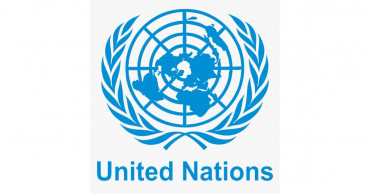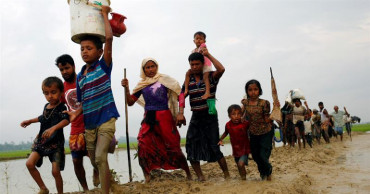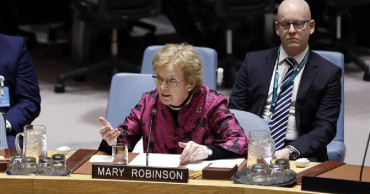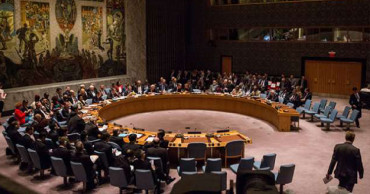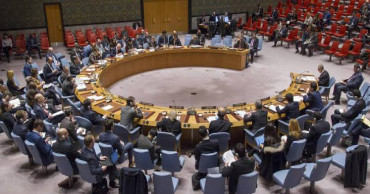Security Council
UN Security Council welcomes new members; 2 are first-timers
Ecuador, Japan, Malta, Mozambique and Switzerland got a formal welcome into the U.N. Security Council on Tuesday, taking the two-year seats they won unopposed in June.
In a tradition that Kazakhstan started in 2018, the five countries’ ambassadors installed their national flags Tuesday alongside those of other members outside the council chambers.
Mozambican Ambassador Pedro Comissário Afonso of Mozambique called it “a historic date” and Swiss Ambassador Pascale Baeriswyl said she felt “a deep sense of humility and responsibility” as their countries marked their first-ever terms on U.N.’s most powerful body. Malta joined for a second time, Ecuador a fourth and Japan a record 12th.
China, France, Russia, the United Kingdom and the United States are permanent, veto-wielding members of the group. Its 10 other members are elected by the 193-nation General Assembly for staggered, two-year terms. They’re allocated by global regions.
Read more:UN Security Council adopts first-ever resolution on Myanmar; China, Russia and India abstain from voting
To many countries, winning a council seat is considered a signature diplomatic accomplishment that can raise a nation’s global profile and afford small countries a bigger voice than they might otherwise have in the major international peace and security issues of the day.
The council deploys peacekeeping missions, can approve sanctions and speaks out — sometimes — on conflicts and flashpoints, while also surveying such thematic issues as terrorism and arms control. While many matters are perennials on the agenda, council members also can use the platform to spotlight emerging concerns or topics of particular interest to them.
Countries often campaign for the council for years. Some 60 nations have never had a seat since the group’s formation in 1946.
Read more: Ambassador Muhith briefs Security Council as Chair of Peacebuilding Commission
The five latest members are replacing India, Ireland, Kenya, Mexico and Norway. Their terms ended Dec. 31.
The other current two-year members are Albania, Brazil, Gabon, Ghana and United Arab Emirates.
3 years ago
Mandate of UN peacekeeping mission in Mali should be extended, Security Council hears
Amid a delayed return to civilian rule, the deteriorating security and the dire humanitarian and human rights situation in Mali, the mandate of the UN Multidimensional Integrated Stabilization Mission in Mali should be extended for another year, speakers told a Security Council meeting on the situation in Mali on Monday.
UN Mission's mandate needs to be bolstered
"While the challenges in Mali are numerous and complex, they are far from being insurmountable," said El-Ghassim Wane, special representative of the secretary-general in Mali and head of the UN mission, expressing hope for breakthroughs.
Echoing Secretary-General Antonio Guterres's acknowledgement of the need for the mission's continued presence and recommendation to extend its mandate for another year, Wane stressed the importance for the mission to be allowed to move freely to fulfil its mandate.
Armed conflicts have led to massive displacement, said Sadya Toure, director of Mali Muso, a non-profit for girls' education, when briefing the council on behalf of civil society.
Also read: 2 UN peacekeepers killed in 6th incident in Mali in 2 weeks
"Women are not safe anywhere," and many schools have closed across the country, affecting some 450,000 children, she said, adding that teenagers in Mali have grown up in a violent environment without any prospects, and high rates of unemployment "have led to insecurity and social unrest," making teenagers easily recruited for armed groups.
Addressing these issues must be a priority if the international community wants to ensure long-lasting peace and reconciliation, she said, emphasizing the need to bolster the UN mission's mandate to allow it to operate alongside Malian forces to combat terrorism.
Broad support
In the ensuing discussion, members broadly supported the extension of the mandate.
Nicolas de Riviere, the permanent representative of France to the United Nations, proposed renewing the mission's mandate for another year. Meanwhile, he said the Malian transitional authorities must also take up their responsibilities and remove obstacles to the mission's activities and the rotation of contingents.
The mission would benefit from stronger support in troop contribution, capacity-building on counter-terrorism measures and provision of adequate logistics, said Harold Agyemag, Ghana's permanent representative, also speaking for Gabon and Kenya.
While highlighting the critical role of the mission, India's permanent representative T. S. Tirumurti emphasized the importance of not burdening the mission with direct counter-terrorism-related operations, injecting a different perspective.
These operations need to be undertaken by national security forces, he said, adding the concerns raised by the mission regarding the capacity gaps result from the withdrawal of international forces from Mali.
Also read: UN peacekeeping convoy attacked in Mali -- 1 killed, 3 hurt
Noting most victims were from the pastoralist Fulani groups, Odd-Inge Kvalheim, Norway's deputy permanent representative, pointed to the ethnic dimension of the violence, and insisted the UN mission "be given full and unrestricted access to investigate such crimes."
The conflict in the northern part of the country has spilled into its center, spread across the entire nation and has now reached neighboring states, said Malian Foreign Minister Abdoulaye Diop, noting that to reverse this trend, the government has invested massively in national defense and security forces.
Deteriorating security
According to the secretary-general's latest report on Mali dated June 2, the departure of French and other international forces is likely to create a vacuum in parts of Mali that terrorist armed groups may exploit.
The violence involving Islamic State-affiliated groups, which killed hundreds of civilians and displaced 32,000 people in the eastern Malian region of Menaka, can be attributed to the imminent departure of these forces, according to the report.
Since February, Mali's authorities have been blocking the rotation of 2,480 uniformed personnel from seven West African countries. This was in response to the sanctions the Economic Community of West African States imposed on Mali in January, due to the delays in Mali's political transition to restore constitutional order after coups d'etat in 2020 and 2021, according to the Security Council report.
Mali remains one of the most dangerous places for peacekeepers. Established in April 2013 following a military coup and the occupation of the north by radical Islamists, the UN mission in Mali supports political processes and performs tasks related to security and civilian protection. ■
3 years ago
US demand for Iran sanctions could trigger UN crisis
The United States is poised to call for the United Nations to reimpose sanctions on Iran under a rarely used diplomatic maneuver after a resounding defeat in the Security Council.
5 years ago
Security Council adopts resolution backing UN humanitarian ceasefire call
The UN Security Council on Wednesday adopted a resolution on COVID-19, demanding a general and immediate cessation of hostilities in all situations on its agenda.
5 years ago
UN mission welcomes Security Council resolution endorsing Berlin conference outcome on Libya
The United Nations Support Mission in Libya (UNSMIL) on Thursday welcomed the Security Council's resolution 2510, which endorses the outcomes of the recent Berlin conference on Libya.
6 years ago
UN welcomes ICJ order; trusts Myanmar will duly comply with it
Welcoming the order of the top UN court, Secretary General Antonio Guterres has said he trusts that Myanmar will duly comply with the court’s order.
6 years ago
Security Council calls on member states to fully comply with UN Charter
The United Nations Security Council on Thursday adopted a presidential statement urging all member states to fully comply with the UN Charter while recognizing the critical importance of the Charter to the maintenance of international peace and security.
6 years ago
5 countries assume responsibilities as non-permanent members of Security Council
Estonia, Niger, Saint Vincent and the Grenadines, Tunisia and Vietnam began to assume responsibilities on Thursday as non-permanent members of the United Nations Security Council.
6 years ago
Security Council renews partial lifting of arms embargo on Somalia
The UN Security Council on Friday renewed for another year the partial lifting of the arms embargo on Somalia, and added a ban on chemicals used for making improvised explosive devices.
6 years ago


.jpg)

